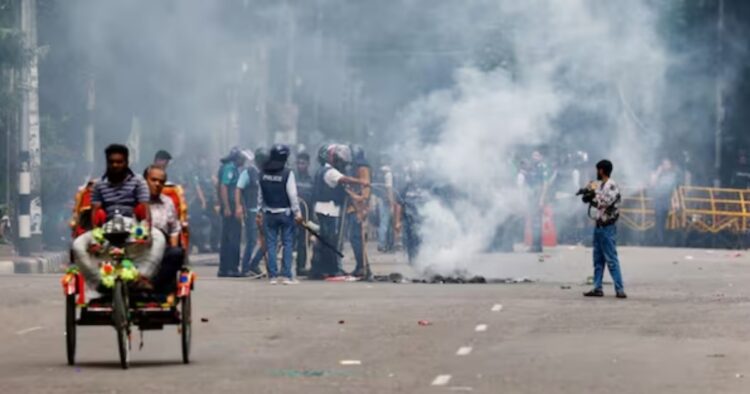Harsh Shringla, India’s former High Commissioner to Bangladesh and Foreign Secretary, recently suggested that foreign involvement might be behind the ongoing unrest in Bangladesh. According to Shringla, it is crucial for India that peace is restored in Dhaka, the capital of Bangladesh.
Shringla emphasized the importance of maintaining strong relations between India and Bangladesh. He noted that India is prepared to engage with any government in Bangladesh to ensure stability. “It is in India’s interest that peace is restored in Dhaka,” he stated. “People-to-people relations are strong between the two countries.”
The current political crisis in Bangladesh, Shringla explained, has multiple contributing factors. Although student protests appear to be the immediate cause, underlying economic issues play a significant role. The economic strain in Bangladesh has been building up since the COVID-19 pandemic. The global situation, including the Ukraine conflict, has further worsened the economic conditions by increasing the prices of essential goods such as fuel, food, and fertilizers.
“On the face of it, it has been the quota issue that the students have put forward,” Shringla said, referring to the initial reason for the protests. “But there are underlying economic factors. COVID-19 has hit the Bangladesh economy very hard. The Ukraine conflict has resulted in a spike in the prices of essential commodities from fuel to food to fertilizers, which Bangladesh imports. They’ve had a very difficult balance of payments situation. Inflation has gone up by 17 percent to 20 percent.”
The combination of these economic difficulties has led to widespread frustration, particularly among the youth, who have taken to the streets to express their discontent. Shringla pointed out that this frustration is not only due to the immediate economic challenges but also because of long-term issues that have been exacerbated by recent global events.
In addition to the economic and social factors, Shringla mentioned the involvement of opportunistic political groups. The opposition party BNP and the radical Islamist group Jamaat-e-Islami, which has pro-Pakistan leanings, have both joined the protests. Their participation has intensified the violence.
“Opportunists, whether it’s the opposition BNP or the Jamaat-e-Islami, which is the radical, pro-Pakistan Islamist grouping that is very active on the streets, they have joined the protests and they have brought in that violence into the protests,” Shringla said. He also did not rule out the possibility of foreign powers being involved in the unrest, suggesting that certain external interests might be exploiting the situation for their own gains. “You cannot rule out the fact that certain interests have been fishing in troubled waters,” he added.
Shringla’s remarks underscore the complexity of the situation in Bangladesh. The protests are not just about immediate grievances but are also driven by deeper economic issues and possibly influenced by external forces. For India, maintaining peace and stability in Bangladesh is crucial, and Shringla’s insights highlight the multifaceted nature of the current crisis.

















Comments